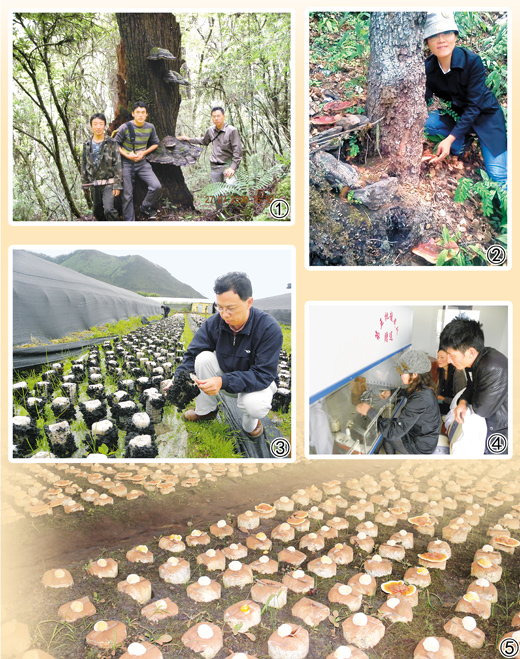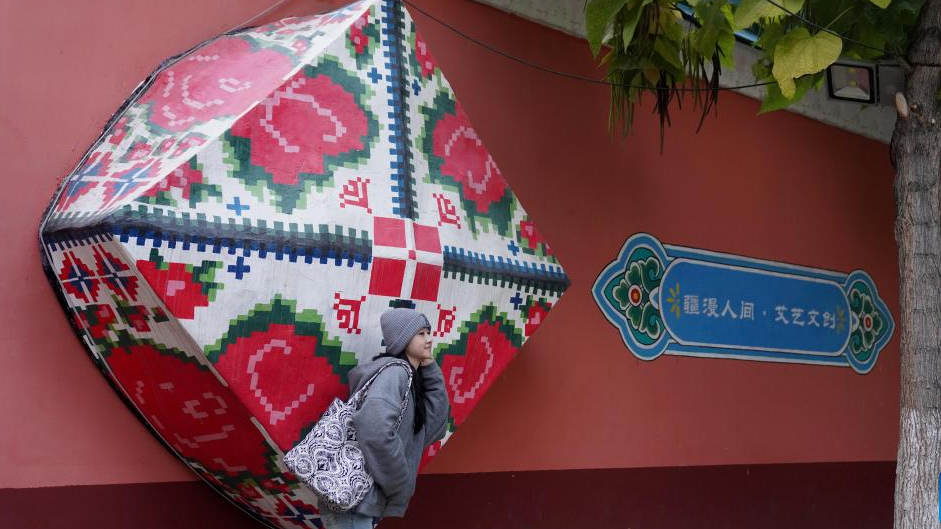Experts from Guangdong help Xizang develop thriving mushroom industry
Inside an over 100 square meters greenhouse of a company in Nyingchi city, southwest China's Xizang Autonomous Region, rows of shelves with six layers hold 20,000 packages of lingzhi mushrooms spawns, also known as Ganoderma lucidum, a medicinal fungus.
This scene, once unimaginable in the autonomous region, is now a testament to the power of scientific collaboration and cross-provincial support.

①: Experts from the Institute of Microbiology at the Guangdong Academy of Sciences in south China's Guangdong Province and a man of the Tibetan ethnic group collect wild mushrooms in a primitive forest in southwest China's Xizang Autonomous Region. (Photo courtesy of the Institute of Microbiology at the Guangdong Academy of Sciences)
②: Hu Huiping, an expert from the Institute of Microbiology at the Guangdong Academy of Sciences in south China's Guangdong Province, collects samples of Ganoderma leucocontextum in Bome county, Nyingchi city, southwest China's Xizang Autonomous Region. (Photo courtesy of the Institute of Microbiology at the Guangdong Academy of Sciences)
③: Yang Xiaobing, an expert from the Institute of Microbiology at the Guangdong Academy of Sciences in south China's Guangdong Province, checks on the growth of black fungi in Nyingchi city, southwest China's Xizang Autonomous Region. (Photo courtesy of the Institute of Microbiology at the Guangdong Academy of Sciences)
④: Experts from the Institute of Microbiology at the Guangdong Academy of Sciences in south China's Guangdong Province teach cultivation techniques of edible mushrooms to people of the Tibetan ethnic group. (Photo courtesy of the Institute of Microbiology at the Guangdong Academy of Sciences)
⑤: Ganoderma leucocontextum is cultivated on a large scale in Nyingchi city, southwest China's Xizang Autonomous Region. (Photo courtesy of the Institute of Microbiology at the Guangdong Academy of Sciences)
"I had never thought lingzhi mushrooms could be cultivated this way here," said Tamdrin Tsering, an official at the science and technology bureau of Nyingchi. His amazement stems from the groundbreaking work of experts from the Institute of Microbiology at the Guangdong Academy of Sciences in south China's Guangdong Province.
In the 1990s, under a project to assist Xizang jointly launched by the Guangdong Academy of Sciences and the regional academy of agricultural and animal husbandry sciences, the institute sent several experts to Xizang to help build the autonomous region's first edible mushroom research laboratory and first edible mushroom cultivation base.
In 2009, led by Yang Xiaobing, deputy director of the edible mushroom research and development center of the institute, a team from Guangdong launched a 10-year project to provide scientific and technological assistance to Nyingchi's mushroom industry.
Two years later, Wu Qingping, an academician of the Chinese Academy of Engineering at the institute, led a delegation to Nyingchi, further catalyzing the project's growth.
Over the years, the institute has sent over 100 science and technology experts to Xizang, with their footprints stretching across Milin city, Bome county, Medog county, and Zayu county.
Thanks to the dedicated efforts of experts from Guangdong, mushrooms have become a thriving industry in Xizang.
The journey hasn't been without its challenges. When Yang, as a member of a research team sent by the Guangdong Academy of Sciences, arrived in Xizang in 1996 for the first time, he was responsible for guiding the building of an edible mushroom research and cultivation platform, and participated in the survey of wild macrofungi species, including edible mushrooms, in the autonomous region. Overcoming obstacles like altitude sickness and frequent landslides, the team collected over thousands of samples and identified more than 1,000 macrofungi species in three years.
Xizang boasts abundant wild mushrooms, but faces issues of inconsistent quality and vulnerability to climate fluctuations and geographical conditions. "Only through artificial domestication and cultivation can we ensure stable production," said Yang.
Undeterred by various obstacles, Yang and his team set about building the research laboratory and the cultivation base.
Their perseverance paid off, successfully introducing edible mushroom varieties like shiitake mushrooms and oyster mushrooms to the regional capital Lhasa. More impressively, they managed to domesticate local wild edible mushroom varieties.
Today, the laboratory and the cultivation base led by experts from the Institute of Microbiology have become national-level research and experimental stations for edible mushrooms, with artificially cultivated edible mushroom products ubiquitous in markets across Xizang.
For locals like Tamdrin Tsering, the learning curve was steep but rewarding. "I started from zero. Experts from Guangdong imparted techniques about edible mushrooms to me with utmost dedication and in a hands-on manner," Tamdrin Tsering said. After a period of learning, he passed on his expertise to local villagers in Nyingchi.
The Institute of Microbiology has nurtured a batch of local talents in the research and cultivation of edible mushrooms in Nyingchi. It has also established an edible mushroom spawn station and a cultivation demonstration platform for the city.
Ganoderma leucocontextum, a new species of Ganodermataceae endemic to the Qinghai-Xizang Plateau, has been domesticated, cultivated, and commercialized thanks to the combined efforts of several scientists from the institute, including Wu, Yang, Hu Huiping, and Li Taihui. At present, over 30 enterprises and farmer households in Xizang produce more than 2.7 million bags of the mushroom species annually.
In Milin county, Nyingchi, grower Li Jianyang tends to his lingzhi mushrooms in three greenhouses covering 1.5 mu (0.1 hectares) of land. "Besides the greenhouses, I grow lingzhi mushrooms in 10 mu of forests. This year, I expect to harvest 150-250 kilograms of dried lingzhi mushrooms," he said.
A portion of his products are sold to tourists, and more are acquired through downstream companies, including Guangdong Micro Edible Mushroom Technology Co., Ltd., for further processing.
In 2020, the company signed agreements for the processing of lingzhi mushrooms with Nyingchi's edible mushroom enterprises, helping the city establish a complete edible mushroom industry chain from cultivation to deep processing and branding.
"Lingzhi mushrooms can be used in health products, beverages, and skincare," Yang said, expressing optimism about the market prospects of lingzhi products in the future.
Photos
Related Stories
Copyright © 2024 People's Daily Online. All Rights Reserved.









